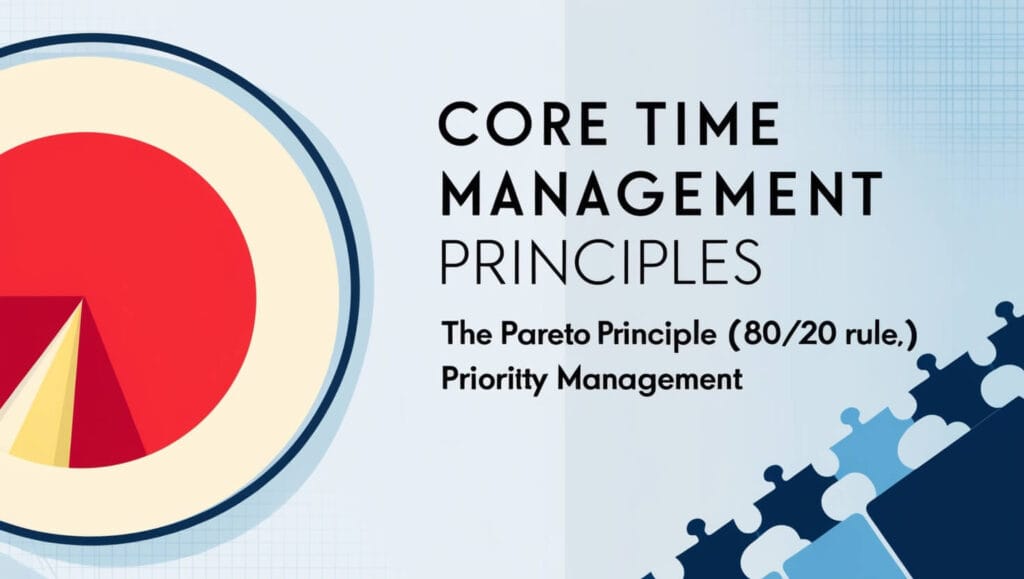
The Modern Time Management Challenge
In today’s fast-paced world, effective time management has become more crucial than ever. With the constant barrage of notifications, emails, and competing priorities, mastering the art of time management isn’t just about productivity – it’s about maintaining our sanity and achieving our most important goals.
Creating Your Personalized Time Management System

Step 1: Assessment and Analysis
- Track current time usage (Document how you spend your time to identify areas for improvement)
- Identify productivity patterns (Recognize when you’re most effective to optimize your time management strategy)
- Note common time wasters (Spot activities that drain time without contributing to your goals)
Step 2: Strategic Implementation
Developing your system:
- Choose appropriate tools (Select time management applications that match your working style)
- Establish daily routines (Create consistent patterns that support effective time management)
- Set clear boundaries (Define limits to protect your time management priorities)
Advanced Time Management Strategies
- Energy Management Integration
Key concepts:
- Peak performance timing (Schedule important tasks during your most productive hours)
- Energy preservation techniques (Methods to maintain consistent productivity throughout the day)
- Recovery period planning (Strategic breaks that support long-term time management success)
- Deep Work Implementation
Essential practices:
- Distraction elimination (Create environments that support focused time management)
- Concentration building (Gradually increase your capacity for sustained attention)
- Progress tracking (Monitor improvements in your time management effectiveness)
- Batch Processing for Time Management
Efficient grouping:
- Email management blocks (Dedicated time for handling correspondence efficiently)
- Administrative task batching (Grouping similar activities for improved time management)
- Creative work sessions (Protected periods for innovation and deep thinking)
Core principles backed by research:
- Ultradian rhythms guide optimal work periods (Our brains naturally cycle through 90-120 minute periods of high productivity, crucial for time management planning)
- Recovery periods are essential for sustained productivity (Strategic breaks are a vital component of effective time management systems)
- Energy management correlates with time management (Managing energy levels is as important as managing time itself)
Core Time Management Principles

- The Pareto Principle (80/20 Rule)
Implementation strategies:
- Analyze your daily tasks for high-impact activities (Review tasks regularly to identify which 20% produce 80% of results in your time management system)
- Focus resources on the most productive 20% (Allocate prime time and energy to high-value activities for optimal time management)
- Minimize time spent on low-value activities (Reduce or eliminate tasks that don’t contribute significantly to your goals)
- Priority Management Within Time Management
Essential components:
- Clear goal setting (Define specific, measurable objectives to guide your time management decisions)
- Regular priority review (Schedule weekly assessments of your time management priorities)
- Strategic task selection (Choose tasks that align with your primary goals and time management strategy)
- The Four Quadrants of Time Management Framework
Quadrant 1: Urgent and Important
- Crisis management (Handling immediate issues that require your attention, crucial for effective time management)
- Deadline-driven projects (Tasks with imminent due dates that must be prioritized in your time management system)
- Emergency responses (Unexpected situations requiring immediate action, testing your time management flexibility)
Quadrant 2: Important but Not Urgent
- Strategic planning (Long-term thinking and goal setting that improves overall time management effectiveness)
- Relationship building (Investing time in professional and personal connections that support your time management goals)
- Personal development (Activities that enhance your skills and time management capabilities)
Modern Time Management Techniques
- Time Blocking Method
Essential components:
- Begin with priority tasks (Start your day by scheduling your most important work during peak energy hours)
- Schedule blocks based on energy levels (Align your time management schedule with your natural productivity patterns)
- Include buffer time (Build flexibility into your time management system by adding space between blocks)
- The Pomodoro Technique in Time Management
Implementation steps:
- 25-minute focused work sessions (Short, intensive work periods that maximize concentration and time management efficiency)
- 5-minute breaks between sessions (Brief recovery periods essential for maintaining productivity throughout the day)
- Longer breaks after four sessions (Extended rest periods that prevent burnout and support sustainable time management)
- Digital Tools for Modern Time Management
Essential applications:
- Task management platforms (Software that helps organize and track activities within your time management system)
- Calendar optimization tools (Applications that enhance scheduling efficiency and time management coordination)
- Focus enhancement apps (Programs designed to minimize distractions and improve time management effectiveness)
The Foundation of Time Management

The Psychology of Time
Key psychological principles affecting time management include:
- Time perception varies based on task engagement (Our perception of time changes significantly when we’re deeply focused, making effective time management crucial for task completion)
- Emotional states affect our sense of time (Stress and anxiety can distort our time perception, impacting our ability to manage time effectively)
- Cultural differences influence time management approaches (Different cultures view and manage time differently, requiring adaptable time management strategies)
- Personal chronotypes impact peak productivity periods (Understanding your natural energy rhythms is essential for optimal time management planning)
The Science of Productivity and Time Management

Overcoming Common Time Management Challenges
The journey to effective time management often encounters several significant obstacles. Understanding and preparing for these challenges is crucial for long-term success in managing your time efficiently.
Procrastination: The Time Management Enemy
Procrastination represents one of the most significant barriers to effective time management. This common challenge stems from various psychological factors, including fear of failure, perfectionism, and task overwhelm. To combat procrastination effectively, we must first understand its root causes in our own behavior.
The key to overcoming procrastination lies in creating systems that make starting tasks easier. Breaking down large projects into smaller, manageable chunks helps overcome the initial resistance to beginning work. For example, instead of facing the daunting task of “write annual report,” break it down into “write introduction section” or even “write first paragraph.”
Digital Distraction in Modern Time Management
In today’s hyperconnected world, digital distractions pose a unique challenge to time management. The average professional checks their email 77 times per day and switches tasks every 11 minutes. This constant interruption severely impacts our ability to manage time effectively and maintain focused work periods.
Creating a digital discipline strategy is essential for modern time management. This involves:
- Structured email checking (Designate specific times for email management rather than responding to each notification)
- Social media boundaries (Establish clear limits on social media use during productive hours)
- Notification management (Create a system that minimizes non-essential interruptions)
The Art of Meeting Management
Meetings can either be powerful tools for collaboration or significant time drains. Effective time management requires a strategic approach to meeting participation and organization. The key lies in being selective about which meetings you attend and ensuring each meeting has a clear purpose and structure.
Industry-Specific Time Management Applications
Different industries require tailored approaches to time management. While the core principles remain consistent, the implementation varies significantly based on professional context.
Knowledge Worker Time Management
Knowledge workers face unique challenges in managing their time effectively. The invisible nature of knowledge work makes it particularly challenging to measure productivity and manage time efficiently. Success in this area requires a balance between focused deep work and necessary collaborative activities.
Creating designated deep work periods becomes crucial for knowledge workers. These blocks of uninterrupted time allow for complex problem-solving and creative thinking, essential components of knowledge work. The key is protecting these periods from the constant interruptions that characterize modern office environments.
Creative Professional Time Management
Creative professionals must balance the structured nature of time management with the fluid nature of creative work. This requires a flexible system that accommodates both scheduled activities and spontaneous creative periods.
A successful time management strategy for creative professionals might include:
- Flexible scheduling that allows for creative flow states
- Buffer time for unexpected inspiration
- Structured periods for administrative tasks
- Protected time for skill development and creative exploration
Leadership and Executive Time Management
Leaders face the additional challenge of managing not only their own time but also influencing how others use their time. Effective leadership time management involves strategic delegation, priority setting, and maintaining availability for important opportunities while protecting time for strategic thinking.
The Future of Time Management

As we move further into the digital age, time management continues to evolve. New technologies and changing work patterns are reshaping how we think about and manage our time. Understanding these trends helps us prepare for future challenges and opportunities in productivity management.
Artificial Intelligence and Time Management
AI is revolutionizing how we approach time management. Smart algorithms now help predict how long tasks will take, suggest optimal scheduling times, and even automate routine decisions. This technological advancement isn’t about replacing human judgment in time management, but rather augmenting our natural abilities to make better decisions about our time use.
Consider how AI-powered calendar tools can now analyze your meeting patterns, suggesting the best times for focused work and automatically scheduling breaks when you’re most likely to need them. This predictive capability helps create more realistic and sustainable time management systems.
The Remote Work Revolution
The shift toward remote and hybrid work has fundamentally changed time management practices. Without the traditional boundaries of office hours and commutes, professionals must develop new strategies for managing their time effectively. This evolution requires a more intentional approach to creating structure and maintaining work-life boundaries.
Successful remote time management involves creating clear delineations between work and personal time. This might mean setting up a dedicated home office space, establishing strict working hours, or using specific routines to signal the beginning and end of the workday.
Wellness Integration in Time Management
Modern time management increasingly recognizes the importance of incorporating wellness into productivity systems. This holistic approach acknowledges that physical health, mental wellbeing, and time management are inextricably linked.
Sustainable Productivity Practices
The focus has shifted from maximizing every minute to creating sustainable practices that support long-term productivity. This includes:
Understanding Energy Management Your energy levels directly impact your ability to manage time effectively. By aligning your most important tasks with your peak energy periods, you can accomplish more in less time while maintaining better work quality.
Mental Health Considerations Modern time management systems must account for mental health needs. This means building in time for stress management, incorporating regular breaks, and maintaining flexibility to prevent burnout.
Measuring Time Management Success
Success in time management isn’t just about getting more done – it’s about achieving the right things while maintaining personal wellbeing. Effective measurement combines quantitative and qualitative metrics to provide a complete picture of productivity.
Key Performance Indicators
Tracking progress in time management requires both objective and subjective measures. While tracking completed tasks and project timelines provides concrete data, it’s equally important to monitor stress levels, job satisfaction, and work-life balance.
Regular Review Systems
Implementing a structured review process helps maintain and improve your time management system. This involves:
Weekly Reviews Set aside time each week to evaluate your productivity, adjust upcoming schedules, and plan for major projects. This regular check-in helps maintain alignment between your actions and goals.
Monthly Assessments Broader monthly reviews allow you to identify patterns, assess progress toward larger goals, and make systematic adjustments to your time management approach.
Building Long-term Time Management Habits

Creating lasting change in time management requires developing sustainable habits. This process takes time and patience, but with the right approach, new behaviors can become automatic.
The Habit Formation Process
Understanding how habits form is crucial for developing better time management practices. Research suggests it takes anywhere from 21 to 66 days to form a new habit, depending on its complexity and your consistency in practice.
Start with small, manageable changes to your routine. For example, begin each day by reviewing your top three priorities, or end each workday by planning the next. These simple practices, when repeated consistently, form the foundation of effective time management.
Environmental Design for Success
Your environment significantly impacts your ability to manage time effectively. Creating spaces and systems that support your time management goals makes it easier to maintain productive habits.
This might involve:
- Organizing your workspace to minimize distractions
- Setting up technology to support focused work
- Creating visual reminders of your priorities
- Establishing clear boundaries between work and relaxation spaces
The Role of Accountability
Having accountability systems in place significantly increases the likelihood of maintaining good time management practices. This could involve working with a mentor, joining a productivity group, or using tracking tools to monitor your progress.
The Evolution of Time Management

As we continue to navigate an increasingly complex world, effective time management becomes more crucial than ever. The key to success lies not in rigid adherence to any single system, but in developing a flexible, personalized approach that evolves with your needs and circumstances.
Remember that improving your time management is a journey, not a destination. Focus on progress rather than perfection, and be willing to adjust your strategies as your needs change. The most effective time management system is one that you can maintain consistently over the long term.
Start implementing these strategies today, but remember to be patient with yourself as you develop new habits. With consistent practice and regular refinement, you can create a time management system that not only improves your productivity but also enhances your overall quality of life.
This article was written by a human writer using AI automation tools to segregate content, improve syntax and spelling, and present the article in a readable and understandable way.


